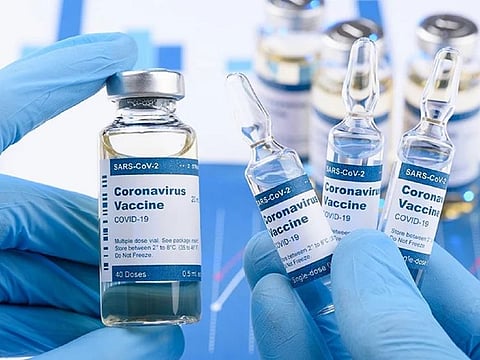Saudi Pharma climbs to five-year high on COVID Pact With CureVac
CureVac's coronavirus vaccine showed a good immune response in early trials

Saudi Pharmaceutical Industries & Medical Appliances Corp. surged to the highest level in more than five years after signing a pact to supply CureVac NV's coronavirus vaccine in the kingdom.
The shares closed 5.5% higher in Riyadh, taking the gain for the year to 58%. The benchmark Tadawul index rose 0.2%. The non-binding memorandum of understanding with CureVac includes the possibility of extending the supply and distribution rights in the United Arab Emirates, Kuwait, Bahrain, and Oman, the company said. Saudi Pharmaceutical said it'll determine the financial impact of the deal after obtaining approvals and signing the final deal.
CureVac's coronavirus vaccine showed a good immune response in early trials and its chief executive officer said advanced clinical trials are on track to start by year-end. The European Union has agreed to pay $11.84 per dose for an initial supply of 225 million doses of CureVac's vaccine candidate, Reuters reported earlier this month.
The company has spent two decades investigating the potential of messenger RNA, in which a vaccine or drug teaches the body's cells to identify and create its own substances to ward off disease. Two other frontrunner vaccine developers are also betting on mRNA - Pfizer Inc. and its German partner BioNTech SE, and the U.S. biotech firm Moderna Inc. Saudi Arabia's deputy health minister said earlier this month the kingdom is working on a plan to obtain sufficient amounts of coronavirus vaccines.
Manufacturing
Riding a wave of interest in mRNA-based vaccines, Germany's CureVac is looking to rapidly drive manufacturing of its own shot candidate. After announcing a plan to bring more partners on board, CureVac has knotted the first of those deals to the tune of 100 million doses. CureVac has tagged German chemical company Wacker to churn out drug substance for its mRNA-based COVID-19 vaccine with the goal of adding 100 million doses per year to the biotech's stockpile, the partners said last week.
Wacker will produce those doses at its Amsterdam facility starting in the first half of 2021, the companies said. The firm plans to "ramp up" its manufacturing capacity to meet that demand and is prepared to expand in the future to add more doses. Wacker's addition to CureVac's manufacturing consortium comes as the biotech looks to add a cadre of partners to boost production of its mRNA shot to more than 300 million doses next year.
CVnCoV
Earlier this month, CureVac unveiled its goal to produce 300 million doses of its vaccine, dubbed CVnCoV, in 2021 and up to 600 million doses in 2022 to meet what it expects to be greater demand given the early success of other mRNA vaccines. To get there, CureVac will bolster its supply chain by enlisting companies like Wacker to help with each key step of the manufacturing process for CVnCoV. Preparations to kick off production and initiate technology transfers are already underway, CureVac said.
Last week, CureVac finalized terms with the EU to supply 405 million doses of CVnCoV, Reuters reported. The bloc will receive 225 million initial doses, with the option to later purchase another 180 million. Financial details were not disclosed.
Rising interest
While still in phase 2a testing, CureVac's shot candidate has seen a rising tide of interest as mRNA peers in the race for a COVID-19 vaccine posted exciting interim results in late-stage trials. Vaccines from Pfizer/BioNTech and Moderna turned up early readouts showing efficacy of 95% and 94.5%, respectively, putting wind in the sales of bullish market watchers calling for a vaccine in arms by the end of the year.
CureVac is a far smaller player than either of its competitors, but it has seen big-name interest in recent months. In July, it signed a strategic collaboration deal with GSK for the research, development, manufacturing and commercialisation of up to five mRNA-based vaccines and monoclonal antibodies.
Back in June, Tesla CEO Elon Musk tweeted that his company was working on making "RNA microfactories" for CureVac to help produce the biotech's vaccine. While it's unclear exactly what Musk meant, some experts said the tweet appeared to refer to portable mRNA "printers," an as yet unproven technology that would significantly cut down the logistics challenges inherent to mRNA vaccines.
Sign up for the Daily Briefing
Get the latest news and updates straight to your inbox






